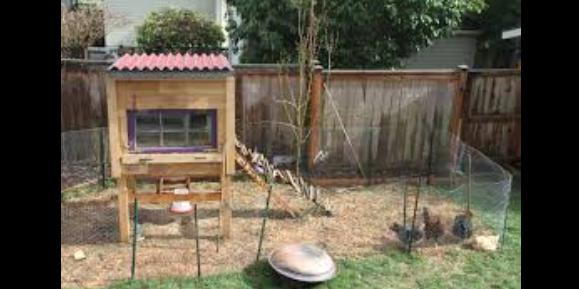
Caring for Backyard Chickens
Recently there has been an increase in the number of people who own backyard chickens, both for fresh eggs and for the companionship pet chickens provide. There are hundreds of different breeds of chickens, all with different behaviors, hardiness, and egg-laying capabilities. However, all chickens have the same basic requirements to be healthy- like a good quality diet, a clean environment, and protection from predators.
Good nutrition is key to maintaining a healthy flock. All chickens should be fed a commercial crumble or pelleted diet that is formulated for their age and reproductive state. For example, it is important that chicks are fed a diet specifically for baby chickens (chicken starter/grower diet) until about 20 weeks of age. Due to the large number of eggs they produce, laying hens need a specific layer diet that is high enough in calcium and protein. Laying hens should also have a separate dish of crushed oyster shell offered daily to provide extra calcium. Roosters and non-laying hens just need a maintenance diet, as a layer ration is too high in calcium for them. Chickens should get plenty of fresh feed daily and they should be allowed to eat as much as they want.
Many chickens love fresh produce such as corn, tomatoes, or leafy greens. Leafy greens such as lettuces, spinach, kale, and escarole are good supplements to a pelleted diet and can be offered regularly. Other vegetables can be offered as well but should not exceed 5% of the daily diet. Limit fruits, scratch, and dried meal worms to small amounts, as they are not nutritionally balanced foods. Do not feed your chickens highly salted foods, chocolate, avocado, alcohol, or caffeine, as these foods can make your bird ill. Chickens can also obtain greens by “mowing” your lawn for you, just make sure there are no pesticides or herbicides used first. Chickens require a large amount of clean, fresh water daily so always have this available.
The ideal chicken house is easily cleaned, provides shelter from the elements, and protects from predators and rodents. It should be spacious, well insulated, well ventilated, and dry. The house should be located in an area with good drainage so that outdoor areas don’t become muddy. Allow a minimum of 8-10 square feet per bird. For flooring, concrete is easiest to clean, although wood covered with a waterproof barrier also works well. Cover the floor with 8” or more of pine or aspen shavings. Straw can be used as additional bedding or to line nest boxes, but do not use hay as it becomes moldy very easily. At least once a week, remove any soiled or moist litter, and replace with dry litter. For laying hens, provide nest boxes in a quiet, dark area of the coop. Three to four hens can comfortably share one nest.
Chickens are ground-dwelling birds during the day but like to roost off of the ground at night. Provide sleeping perches at a comfortable height for your breeds of chickens. Make sure that perches are securely attached, not loose or swinging. Heavy-bodied chickens do better with wider and flatter perches than cylindrical dowels.
During the day, chickens need space to forage and engage in natural behaviors. They require full-spectrum natural sunlight for vitamin D and overall health and should have an outdoor run or be allowed to range freely. They also need ready access to cool, shady areas to avoid overheating in hot weather. Chickens enjoy taking dust baths and will do so when they have access to dry dirt. If your chickens are confined to a coop that does not have a dirt floor, provide them with a dish of mineral grit to aid their digestion, and with a sandbox for dust baths.
Predators are attracted to chickens and will hurt or kill them if adequate protection is not provided. During the day, chickens should be confined to a fenced yard where they’re protected from four-footed predators such as coyotes, foxes, dogs and cats. At night, chickens should be placed into a secure coop to protect them from opossums, cats, and raccoons. In areas of the coop where there are no solid walls, use durable ¾” wire mesh that is buried at least 6” underground. Rats and mice carry and spread disease, and large rats can also attack your birds. Check your coop regularly for rodent tunnels or droppings. Keep the area around the coop clear of junk and weeds to discourage mice and rats from nesting. If rodents are present, they can be eliminated with traps or poison placed well away from your chickens and other pets.
It is important to observe your chickens every day. Frequent observation will help you get to know what is and is not normal for your chickens. At least once a week, pick up each bird and ruffle through its feathers. Does she feel abnormally thin? Is her crop distended? Do you see any parasites on his skin? Do her leg scales look rough and thickened? Has there been a change in behavior or appetite? Is she sneezing, or having trouble breathing? If you notice these or any other abnormal symptoms, isolate the sick bird and contact us for your bird to be seen by our exotic veterinarian, Dr. Collins.

